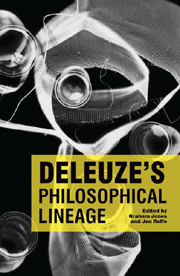Book contents
- Frontmatter
- Contents
- Acknowledgements
- List of Abbreviations
- Introduction: Into the Labyrinth
- 1 Plato
- 2 John Duns Scotus
- 3 G. W. F. Leibniz
- 4 David Hume
- 5 Immanuel Kant
- 6 Solomon Maimon
- 7 G. W. F. Hegel
- 8 Karl Marx
- 9 Hoëne Wronski and Francis Warrain
- 10 Bernhard Riemann
- 11 Gabriel Tarde
- 12 Sigmund Freud
- 13 Henri Bergson
- 14 Edmund Husserl
- 15 A. N. Whitehead
- 16 Raymond Ruyer
- 17 Martin Heidegger
- 18 Pierre Klossowski
- 19 Albert Lautman
- 20 Gilbert Simondon
- Bibliography
- Notes on Contributors
- Index
1 - Plato
Published online by Cambridge University Press: 12 September 2012
- Frontmatter
- Contents
- Acknowledgements
- List of Abbreviations
- Introduction: Into the Labyrinth
- 1 Plato
- 2 John Duns Scotus
- 3 G. W. F. Leibniz
- 4 David Hume
- 5 Immanuel Kant
- 6 Solomon Maimon
- 7 G. W. F. Hegel
- 8 Karl Marx
- 9 Hoëne Wronski and Francis Warrain
- 10 Bernhard Riemann
- 11 Gabriel Tarde
- 12 Sigmund Freud
- 13 Henri Bergson
- 14 Edmund Husserl
- 15 A. N. Whitehead
- 16 Raymond Ruyer
- 17 Martin Heidegger
- 18 Pierre Klossowski
- 19 Albert Lautman
- 20 Gilbert Simondon
- Bibliography
- Notes on Contributors
- Index
Summary
PART I
The guiding principle behind Gilles Deleuze's commentaries on other philosophers could be summed up with one phrase: ‘keep your friends close, but keep your enemies closer’. While Deleuze often treats his philosophical friends in an unexpected and occasionally mischievous manner, as if they were actually strangers (‘a philosophically clean shaven-Marx …’), he treats his enemies with an equally unexpected hospitality, proffering a kind of intimacy, immediacy, and even immanence that will make of them familiars and fellow-thinkers (DR xxi). The experience of dipping into Deleuze's commentaries always provokes a moment of astonishment, as if a queer kind of ventriloquism had been contrived. How is it possible, we ask ourselves, that this philosopher has been made to speak these words, which are his, but which sound as though he had never uttered them before? How is it possible that an enemy has become an intimate?
Perhaps we feel this sentiment most profoundly in the context of Deleuze's commentaries on Plato, especially given that this particular friendship begins with nothing less than a declaration of war. In Difference and Repetition and in the first appendix to The Logic of Sense, the very texts where he develops his most extensive analysis of Plato, Deleuze announces that modern philosophy has never had any other task than the overturning (renversement) of Platonism. Indeed, Deleuze's own philosophy takes its point of departure as, and its measure from, the repudiation of the enduring Platonic legacy, which he regards as responsible for imposing an overarching image of thought at the cost of real difference, of difference ‘in itself’.
- Type
- Chapter
- Information
- Deleuze's Philosophical Lineage , pp. 8 - 26Publisher: Edinburgh University PressPrint publication year: 2009

